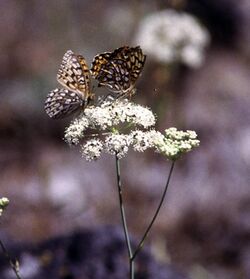Biology:Perideridia oregana
| Perideridia oregana | |
|---|---|

| |
| Scientific classification | |
| Kingdom: | Plantae |
| Clade: | Tracheophytes |
| Clade: | Angiosperms |
| Clade: | Eudicots |
| Clade: | Asterids |
| Order: | Apiales |
| Family: | Apiaceae |
| Genus: | Perideridia |
| Species: | P. oregana
|
| Binomial name | |
| Perideridia oregana (S.Watson) Mathias
| |
| Nutritional value per 100 g (3.5 oz) | |
|---|---|
| Energy | 628 kJ (150 kcal) |
31.68 g | |
1.8 g | |
4.6 g | |
| Vitamins | Quantity %DV† |
| Thiamine (B1) | 10% 0.11 mg |
| Riboflavin (B2) | 10% 0.12 mg |
| Niacin (B3) | 2% 0.3 mg |
| Pantothenic acid (B5) | 23% 1.172 mg |
| Vitamin B6 | 14% 0.176 mg |
| Folate (B9) | 6% 24 μg |
| Vitamin C | 16% 13 mg |
| Minerals | Quantity %DV† |
| Calcium | 11% 110 mg |
| Iron | 9% 1.15 mg |
| Magnesium | 9% 32 mg |
| Manganese | 52% 1.094 mg |
| Phosphorus | 24% 165 mg |
| Potassium | 7% 340 mg |
| Zinc | 12% 1.15 mg |
| |
| †Percentages are roughly approximated using US recommendations for adults. Source: USDA Nutrient Database | |
Perideridia oregana is a species of flowering plant in the family Apiaceae known by the common names Oregon yampah and eppaw.[1] It is native to Oregon and California in the western United States, where it grows in woodland and other habitat. This plant is quite variable in appearance. In general, it is a perennial herb 10 to 90 centimeters tall, its green to waxy-grayish erect stem growing from a cluster of small tubers. Leaves near the base of the plant have blades 3 to 30 centimeters long divided into a variable number of leaflets, which may be subdivided into smaller segments. The inflorescence is a compound umbel of many spherical clusters of small white flowers. These yield ribbed, oblong-shaped fruits 3 to 6 millimeters long.
References
- ↑ Full Report (All Nutrients): Perideridia oregana. National Nutrient Database for Standard Reference. USDA ARS.
External links
Wikidata ☰ Q7168441 entry
 |


